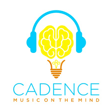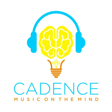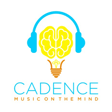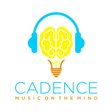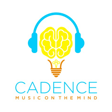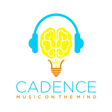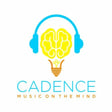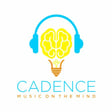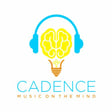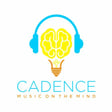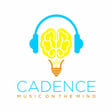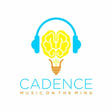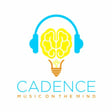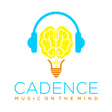Become a Creator today!Start creating today - Share your story with the world!
Start for free
00:00:00
00:00:01

S04 Episode 05: Hearing Loss and Reshaping the Sonic Landscape
Dr. Ethan Castro and Dame Evelyn Glennie, both hearing impaired percussionists, talk through building successful careers as performers and composers not just despite their hearing challenges but in service of them, and reshaping the music landscape for others in the process.
Cadence is the podcast where we talk about what music can tell us about the mind. Hosted by neuroscientist and musician, Dr. Indre Viskontas, the fourth season will bring you the stories of people who experience music outside the bounds of the average listener, and who use music as a tool to be heard in a society in which they are often ignored.
Transcript
Experiencing Music through Touch
00:00:02
Speaker
When you happen to have audience members who are deaf and hearing impaired and who then have the opportunity to come up on stage and be right next to the instrument, they're very clear in how their whole listening experience changes when they're actually physically feeling that sound.
Introduction to Cadence's Season Theme
00:00:26
Speaker
Welcome back to Cadence.
00:00:29
Speaker
I'm Andrey Viscontis. This season on Cadence, we're telling the stories of people who experience music differently than the rest of us. Those who use music as a form not only of expression, but of communication. Of a way to be heard by a society that ignores or outright silences them.
Percussionists Overcome Hearing Challenges
00:00:48
Speaker
In this episode, you're going to hear from two percussionists who have built successful careers as performers and composers, not just despite their hearing challenges, but in service of them, and in the process have reshaped the musical landscape for the rest of us.
00:01:06
Speaker
First, we'll talk to Ethan Castro. He's the founder of the tech startup Edge Sound Research and a newly minted PhD in digital composition. Ethan was born very prematurely, and as a result, he was hard of hearing. As a child, he watched his dad move to music he couldn't hear, but he quickly learned that if he hugged the speakers, he could feel it.
00:01:30
Speaker
And eventually, defying the advice of his doctors, he went on to pursue a career in audio engineering. And then, we'll hear from one of his inspirations, Dame Evelyn Glennie, known worldwide for her performances and credited as the first full-time professional solo percussionist.
Ethan Castro: A Journey in Music Innovation
00:01:53
Speaker
She's also deaf and uses her entire body as a resonating chamber, teaching the rest of us how to listen. Without further ado, here's Ethan. My name is Dr. Ethan Emmett Castro, and it's a very fresh thing for me, but I'm a hard of hearing musician and inventor and all this other stuff, also with threat syndrome. So I have like a fun double whammy that influences my approach to music and the sonic world.
00:02:21
Speaker
Let's go back to the beginning. What caused your hearing to develop differently? Yeah, yeah, yeah. So fun story. I was touch and go for a while as a kid. You know those things where it's like you come out stillborn and they're like, ah, well, this is going to be an interesting life. But at the beginning, the first time I came out, my ears weren't fully formed. And so the ear canal that drains mucus obviously didn't work. And so I had what's normally a very typical surgery, which is you slice the ear drum open, you put the ear tubes or the tympanophobes or something like that.
00:02:48
Speaker
the tympanostomy. I can never say the word. Something about the tympanic membrane, they cut it open, they put the tubes in. Yeah. But I had three sets of those because just because they put the tubes in doesn't mean that it solved any problem. But that was enough to make enough scar tissue. But something else that happened because I was also a very premature baby was that the nerve going to the brain also doesn't accurately transmit the signal. So there's two types of hearing loss, the conductive and the sensory neural, which is not what you look for in the resume for an audio engineer.
00:03:18
Speaker
and a musician. Can you describe what your hearing is like, and do you have corrective devices or enhancement? I used to, because that's just the thing you did. But here's the thing, right? The whole idea of the metaphysics of perspective, I think, whatever. Your green is different from my green, right? If I see green, and it might be purple to me, but it's blue to you, and we keep calling it green, then who are we to know that we're not actually hearing or seeing the same thing?
00:03:46
Speaker
I feel like that is kind of how I learned about the world. I was like, cool, this is the world. The Pacific Ocean is just another way to say specific. There's no S. I didn't hear any sibilants growing up. And so I used to get teased a lot for saying, cause I was also a little kid, I was trying to be accurate. So I was like, I specifically go to this terrible lisp and a terrible stutter too. Growing up, you can't hear the detail. You can't hear the nuance. How are you supposed to know that there's anything there? And then when I was in,
00:04:13
Speaker
grade school, they gave me assisted listening devices. They're trying to go back and forth between if I needed a hearing aid or if I need an assisted listening device. And it just turned out I kind of lived with reading lips.
Ethan's Early Music Influences
00:04:23
Speaker
I grew up in the deaf and hard of hearing culture in Fresno. It's a very supportive group and they taught me how to put captions on everything. So I was reading at like a really young age. They taught my mom how to take care of me as if I was going to be fully deaf.
00:04:36
Speaker
So you were raised with the expectation that you would never hear with your ears. So yeah, I lived my life basically growing up as a deaf child, which means I learned to read really quickly. I learned how to use compensatory tactics really young. And so I got really good at those as a young kid. So when I went to grade school,
00:04:53
Speaker
I didn't really need a hearing aid because I was able to read the lips of my teacher from across the room and so I was able to understand what was going on. So they said, yeah, you know, yes, he needs a hearing device, but he seems to be doing okay in school. So it's not affecting him. And so they thought my hearing was a lot better than it really was. But I imagine that music wasn't playing a major role in your life at that point, right?
00:05:12
Speaker
Music was not here at all because my doctor said, yeah, hey, as long as he doesn't go into music, he'll be just fine. I mean, the only interaction with music I had was my dad was a kind of a connoisseur of like Hi-Fi systems. So he had some pretty big speaker systems and some cars that had some pretty good sound systems. And he also loves dance music. And so he was a big fan of like 80s and 90s early dance music. And so it had a lot of bass to it. And I was like, Hey, this is kind of cool. Like I can feel
00:05:41
Speaker
And I can feel the two distinct portions of it as well as like some really highly produced dance music or not dance music but pop music because pop music was kind of touching dance like with Kylie Minogue back in the day and then early Madonna was also kind of like on the border of dance music and that was my only association with music from when I was a kid till I actually went to high school where I started playing music. How did you discover music in high school?
00:06:07
Speaker
I went to a college prep high school called University High School in Fresno. And one of the requirements is you have to have some sort of musical training coming in because musical theory, there's a music theory course that goes through all four years and it's an important part of the program. So I kind of squeaked in because my sister who had taken, I think like a songwriting class a couple of years before, we started kind of like writing songs together. My parents got me a drum set because they figured, hey, if you're going to play something, maybe it should be something that you can
00:06:36
Speaker
here. So I had drums and it was really interesting. I used to just bang on them, no problem. And then that's when I first realized too, that drums were loud comparatively to other instruments. My parents were like, Hey, can you keep it down? I'm like, what? Oh, I'm sorry. And so my sister and I would come up with different ideas just for fun. And then that was enough to kind of get me in the door to university high school. And then that's where everything kind of clicked. I was like, Oh,
00:07:03
Speaker
My life should be for music. I love this stuff. And I was in every single band. Basically, I came in as a freshman and all the percussionists were seniors and they all graduated. And they're like, cool, you're the only percussionist left. You've had any experience. You're going to be section leader for the next three
Innovative Techniques in Music Perception
00:07:19
Speaker
years. I was like, what?
00:07:20
Speaker
And so I was section leader for orchestra, wind ensemble, and then the jazz group. That's how I was able to jump into the whole music. I went in baptism by fire. I had to train a couple of new freshmen to like what I liked about it and learn to read music real quick and all that.
00:07:39
Speaker
Wow, that sounds really hard. Like going from no music to leading sections in the course of just a year or two would be challenging for someone with superior hearing. How did you manage that?
00:07:52
Speaker
But especially when I first started, I did not have this ability to use vibrations accurately. So when I was growing up, the whole compensatory method was detect if someone's talking to you and kind of make out the shape of the vowel pattern. Well, as people are talking, the waveform, you can kind of feel the waveform shape if you feel a surface.
00:08:12
Speaker
And so that's what I was taught. Feel the desk as your teacher's talking to you so you can kind of make out the waveform, look at the lips to be able to learn the plosives and the sibilance and phonetics, and then put together the phonetics, what you know the phonetics sound like in a clean environment, plus the waveform of the teacher, and that's how you can put together the articulation of a word.
00:08:29
Speaker
That doesn't happen in music. Music is just like, yeah, there's no phonetics. There's no articulation. It's just everyone's facing the other way of the room. And you have to try to be able to pick out what people are doing. Or if there's a piccolo or a flute that's on the other side of the room and they're playing a figure passage and that's your cue.
00:08:45
Speaker
How am I supposed to know that that's actually playing? So I had to really learn a lot about every instrument, how they work and what position, hand positions would make what sound. I use my eyes a lot to be able to read what people were doing and follow people's moves. And then I try to listen to the song or to the piece separately. So I could kind of pick out different cues or at least kind of listen to it like a popular music song where it's like, yeah, here's my part.
00:09:08
Speaker
I just played my timpani. And then over time, I think I got more and more familiar since I used to hang out with the low brass guys and gals in the back of the room. They would show me how things are. I would say, can I feel the bell? You're like, well, sure, I guess. Why not? So I was like, just trust me. And then I would touch the bell and I would start feeling the vibrations and I could tell that they felt different than what the timpani would feel like. But at some point there was a connection of similarity between the two of them. And that's why I made the connection, I think roughly around my junior, senior year of high school.
00:09:35
Speaker
I made the first connection that I could tune the fundamental of the timpani to what the low brass was playing and I could at least be in tune with them. So regardless of everything else that's happening, even if it wasn't in tune with the rest ensemble, I could start feeling the rub between being a little bit off timpani to low brass.
Career in Audio Engineering
00:09:51
Speaker
And I thought, okay, even if I'm not accurately perceiving the pitch, as long as I tune with the low brass, I can at least be in tune with them. I was always like just below like second chair for most stuff because I never had the affinity for pitched percussion because obviously, right? That was the hardest part for me to get.
00:10:07
Speaker
I started getting better at it towards the end of my undergraduate. I went to Fresno State and they have a great music program. I was in every top group, but I was always second and I preferred to be second because I don't know if I was confident enough of my abilities to be responsible for everybody else's position. But at least the percussion sectionals, people were very kind and say, hey, no problem, man. Let's do it again. Hey, no problem. We can run it through again. No problem. And that was helpful.
00:10:33
Speaker
So once you graduated from college, how did you end up in audio engineering? At this point, at the end of my undergrad, I had been going up and down to Los Angeles quite a few times. For people that I met at CSU Summer Arts, they have this program every summer called Summer Arts, where you can take two units or something like that, basically a semester's worth of class, and condense it down to two weeks. So it's very intensive. And one of them was a commercial music writing course. And I was always interested in production. So I get the call in graduation saying, hey, we have a gig with Disney.
00:11:03
Speaker
And I was like, what? I was like, all right, let me call you back. Let me walk across the stage real quick, and I'll call you back and get the details. At the same time, too, all of my professors were kind of like, this kid's not going to do anything. He's too much trouble and whatever. And so I go over there and I give him a hug. And I was like, I just got a gift for this day. I'll see you.
00:11:19
Speaker
They're like, what? And then there, give me details. So the LA Chamber Orchestra was working with Disney and they were actually doing the live orchestration to this animation, the old school animation, like the original stuff, the Steamboat Willie. Yeah.
00:11:34
Speaker
It was like the 75th anniversary of that stuff. Fantastic orchestra. Holy moly. And they needed help because the animation is pre-done and you have to synchronize the orchestra to the animation. You can't slow the animation down to match the orchestra. That started me being in LA. We actually got a place and we made it a production studio house. So we had three studios and it's one little spot and we would have been running nonstop sessions. I would do technical things and they would do different engineering mixing things.
00:12:00
Speaker
It was really technologically advanced for a studio but we were really involved in the music industry for a while and by the time I finished my program at CSU Northridge we had been working with Warner Music and Universal and Sony and we were definitely a songwriting house where we would be able to turn out three different tracks a day per station.
Sound-Touch Technology Exploration
00:12:17
Speaker
Wow, that sounds prolific. And clearly you have a mind for the technical stuff. That's when I started looking and touching the speakers because it was really my own speakers. So I started disassembling it and touching the driver. And that's when I started realizing that just like the timpani, the speaker driver, the bass driver,
00:12:33
Speaker
could be used to be able to glean important information. That's when I noticed that I can walk into any studio, touch the speakers, and be able to understand exactly what was happening in the track. If there was mud in the vocals of the drums we're interfacing with the bass, normally something that would take a while for someone to get used to the room first, and then say, okay, now that I'm used to the room, I can figure out what's going on here. I just walk up, put my hand in my seat, and say, hey, you have mud at this exact frequency, at this exact spot. At the same time, I could turn out two or three more tracks than a normal engineer.
00:13:02
Speaker
And when I applied to the PhD program at UC Riverside, that was certainly a thought going into it, saying, hmm, I wonder if I could explore that relationship a little bit more. I didn't expect to look at technology and make a new technology. I was just looking at exploring why am I able to do that and what are the mechanisms and how to enhance it.
00:13:20
Speaker
So that's when you began to study exactly how you're able to distinguish different sounds through touch. When I started to research this interaction between the sense of sound and the sense of touch, I thought part of it was my own imagination, and part of it was some confirmation, and I had been using other modalities at the same time.
00:13:39
Speaker
I still had my graph on the screen, I had my spectrum analyzer, I had my waveform oscilloscope and stuff on the screen, and so I wasn't sure if I could 100% go just on touch. I knew that I could rely on my sense of touch for a large portion of it, but I'm such a visual person because of the hearing loss as well, that I was afraid that some of it might have been because of the visual aspect as well, and that maybe my sense of touch was overcompensated.
00:14:02
Speaker
And then I started looking up all the other documented reports, the literature that shows that deaf and hard of hearing students, even former musicians, all shared the same experience. In particular, Dame Evelyn Glennie, who has her hearing essay that says that if we can feel the lower frequency vibrations so clearly, why can't we hear the higher frequency vibrations through the sense of touch also equally as clearly?
00:14:25
Speaker
Since hearing is just a form of touch and the sound waves are touching your eardrums just as you're touching the rest of the skin on your body Yes, it may not be as sensitive but a sense of touch is still a sense of perceiving vibration So then I started really diving into okay What are the types of skin cells that are responsible for detecting vibrations and what types of vibrations can they feel?
00:14:45
Speaker
And it turns out that the mechanical receptors and the different types of mechanical receptors or mechanical receptors in the skin that detect a certain different frequency ranges. And if you combine them together as well as the subcutaneous frequency response of your actual tissue, then if your brain is used to it, you can formulate this sense of vibration. It's crazy. And it's like, wow, this is something that.
00:15:04
Speaker
Every Deaf and Hard of Hearing person, probably in the world, has done, even if it hasn't been studied, but it's certainly an experience that we all use as a necessity to be able to interact with the Sonic world.
00:15:18
Speaker
And so that's where the thought came up of if there's a way I could just flatten out the curve and make those higher frequencies just as present or at least a little more present than where they are currently, then perhaps we might be able to get to a point where hearing is not necessarily 100% reliant just on speakers and microphones and eardrums, but it could be like, hey, a thing could be a speaker and that if you touch it, then you can get that information directly to your body.
Edge Sound Research: Innovating Accessibility
00:15:45
Speaker
So that's what you're hoping to accomplish with your new tech company, Edge Sound Research. How did it all come together? Yeah, so as a bunch of students at UCR, I was just trying to get a grant to build it, just to build a prototype. And essentially, I needed to build the prototype to perform my dissertation piece. So I joke to my co-founder all the time. I asked him for two weeks of his time to help me get a grant to make this technology that I could use for my dissertation piece.
00:16:13
Speaker
We pitched it to the university. They said, hey, you should start a startup company because you're not going to get this grant because there's a bunch of other professors with much higher pedigree and research labs that have done this a million times and that they're going to go with that one bureaucratically, politically. But you guys have something very interesting and we'd love to see it actually go through with it.
00:16:31
Speaker
We made a division of my existing company to start receiving grants for student startups. And we had to come up with a name like, well, Edge Sound Research. It's research on sound and we'll keep it under the Edge moniker that we already had for Edge Original. The investors said, we like the fact that you're completely thinking differently and we want to invest in you guys. So that's what we've been doing for the past four years at this point now, is trying to figure out what's blocking this type of technology from coming to fruition and what is blocking it from becoming commercially viable.
00:17:01
Speaker
And so thankfully, several large scale venues are partnering with us to start it off in a section to gather feedback so we can take it back, refine it and actually create a version of it to implement through an entire section or entire ring around the bowl. It's really been amazing that they're partnering with us to say, hey, we'll start you here and then we're going to expand with you for sure because this feedback is ridiculous that we're getting from it.
00:17:23
Speaker
And it's so cool to see companies like that partnering with us. And the cool thing is they don't even know that it's like an accessibility thing or that it came from an accessibility thing. Obviously they know my story. They said, cool, that's how you came up with it. But they don't know that it's going to actually help people every day. Even people who are starting to lose your hearing have a mild hearing loss. They don't know that they're going to be able to sit down in a seat and be able to watch a game or watch a movie or be part of what's happening on the court and hear, quote unquote, better than they've ever heard before.
00:17:52
Speaker
And my overall goal here, at least with this one technology, is it should be invisible. It shouldn't be something that you're actively going towards and saying, this is my accessibility. No, it should be cool technology that built in has these nascent benefits for these other populations that you don't have to think about because it's such an integrated solution that it addresses all aspects of it at the fundamental level. That's a good technology.
00:18:20
Speaker
I couldn't agree more with Ethan's approach to accessibility. I love the idea that his tech might someday be ubiquitous in performance spaces and sports venues, anywhere that sound plays a major role in our experience. What separates his tech from other haptic devices is this insight that the higher frequencies, which are harder to sense through touch, can be translated into a signal that our mechanoreceptors can accurately distinguish and make sense of.
00:18:48
Speaker
with a little bit of algorithmic retooling. So much of hearing is in the brain, not in the ears, and he's tapped right into that. We'll hear from Ethan again in a future episode, but for now, let's turn to my conversation with Dame Evelyn Glennie, the world's first full-time solar percussionist who also happens to be deaf.
00:19:11
Speaker
Or maybe she's found a way to use her unique way of sensing sound to not only thrive as a musician, but to open up a whole new sonic world to the rest of us too.
Evelyn Glennie's Musical Beginnings
00:19:25
Speaker
Dame Glenny, welcome to Cadence. Tell us about your early childhood experiences.
00:19:31
Speaker
What was the environment like that you grew up in? I was brought up on a farm in the northeast of Scotland and really the farm life and the farm environment was my orchestra. And of course you're dealing with a soundscape that is about nature, about machinery, about livestock and so on. So there's a real mixture of sounds that are very emotional sounds.
00:19:55
Speaker
And there are also sounds that ignite responsibility and trust, especially when you're around machinery and around livestock. And so it's the kind of sound environment that really taps into many aspects that become very useful as you're growing up.
00:20:11
Speaker
And it was also this kind of soundscape that ignited independence as well, because you had a chance to observe sounds and digest sounds and feel the sounds rather than only hear the sounds. And I think you only really become aware of that when you're actually using vocabulary to describe the sensations.
00:20:35
Speaker
And so when you describe a sound as being a cold sound or a warm sound or a present sound or a distant sound or a distressed sound or a happy sound, when you're thinking about livestock or something like a sheep or a lamb or whatever, you very quickly pick up on the kind of hungry sounds or the desperate sounds or sad sounds, even distressed sounds and so on.
00:21:01
Speaker
And I think you're very, very much in tune with that sort of thing. So I really think the farm life was a terrific kind of landscape for me and ignited that sense of curiosity towards sounds and the feelings of sounds. I don't mean the physical feeling, not at this point anyway, but certainly the emotional feel of sounds.
00:21:22
Speaker
And of course, in those days, I was born in 1965, so we were not glued to our televisions in those days. Yes, that's right. Not just on farms, though I suppose there also weren't the same kinds of distractions that city life provided.
00:21:37
Speaker
Our social lives were meeting other people, having friends around, having relatives around and so on. And it meant that we were always creating our own entertainment. So many of the farm houses actually had pianos, can you believe, because there was usually someone in that family who could play by ear. And this was the Scottish traditional music.
00:22:00
Speaker
So someone who could perhaps play the piano, someone could maybe play the accordion or the fiddle or sing. And of course storytelling and poetry were very much part and partial, that kind of social entertainment really. And so again, this was creating the landscape of having the balance between playing by ear and really listening. You're not just listening to the notes or listening to a melody, you're listening to how all of that is projected.
00:22:29
Speaker
And so you almost have the body language of the music, the body language of the sound. And that was fascinating for me and I very much enjoyed these kind of spontaneous occasions because we weren't looking at music as being right or wrong, good or bad.
00:22:47
Speaker
We've lost so much of that spontaneous music making at home.
Adapting to Hearing Loss in Music
00:22:52
Speaker
Did you also have music training in school? I went to a tiny country school just very close to the farm. It was in the middle of nowhere, literally in the countryside. Once a week, the entire school had a music lesson, a general music lesson where we would sing, we would play the recorder, we learned how to play the recorder there.
00:23:12
Speaker
We would deal with folk tunes and all sorts of things. We were taught how to read the basics of music. So by the time we left that school at about 11, 12 years old, we could all read music. So when did you first notice that your hearing was different from the other kids?
00:23:32
Speaker
I began having issues with my hearing from the age of eight and I had no idea at that time that there was any kind of hearing impairment happening. It was just simply sheer pain in the ears, especially if I went outside and if it was really windy or if there was a lot of noise or something, then it would really ignite a lot of pain in the ears.
00:23:54
Speaker
One of the things when I was at primary school in the tiny little country school was that the entire school had their hearing tests on a regular basis, maybe once a year. So someone, an audiologist would come in and our hearing was tested. The audiologist noticed something not quite right. And so she had elected the school who elected my parents and so on. And then we had more tests with another audiologist.
00:24:18
Speaker
eventually I skidded out with hearing aids and that was kind of useful as regards to speech and so on but as soon as I started playing music it was incredibly distracting it just boosted all of the sound and then I just simply could not decipher where what or anything you know it was just this kind of barrage of sound
00:24:40
Speaker
And so I just find great relief taking them off and actually just having peace in a way with the sound. Then again, I put them on for normal things and for school and so on. And then when I went to secondary school, I was obviously continually being tested. And so the nerves of the ears were deteriorating.
00:25:00
Speaker
and I was becoming more and more dependent on the hearing aids and then I was kitted out with a phonic ear which is a device that the teacher also wears so that the teacher can walk around the classroom and you can still pick up what the teacher is saying. And then I went to a larger comprehensive school and really the headmaster made absolutely sure that music was a very important part of the entire school. So music was a very important subject because
00:25:29
Speaker
He realized the kind of offshoots of music, the impact that music has in really kind of building lots of disciplines and lots of bridges as well. And the score was just full of music. You know, there's music everywhere and a large proportion of the staff also played music.
00:25:48
Speaker
And so they were involved in the school orchestras and bands and in the shows and all of that sort of thing. I really loved the piano, but I wanted also something else to go alongside that. And I saw percussion and I thought, oh, I'd really like to give that a go. We had one very good percussion teacher.
00:26:05
Speaker
And his background was the army and so he was very disciplined as an all-round musician. So eventually I was given the opportunity to meet with him, to do a little audition as it were. The audition actually only lasted a few seconds because he basically said, take the snare drum away for one week and I will see you next week. So I had this snare drum and I had no stand, no sticks. It was literally the snare drum. I had no idea what to do with it.
00:26:31
Speaker
So I looked at the snare drum over the course of a week and then eventually I sort of tapped it and then I thumped it and then I tickled it and I scraped it and I did all sorts of things and realized that it resonated in different ways depending on the surface that it was on.
00:26:47
Speaker
And at this stage, I was quite dependent on hearing aids and the hearing aids was boosting the sound, but not giving me the clarity. So actually a lot of soft sounds were much more pleasant than loud sounds. But my instinct was to play everything really loudly because I felt I needed to hear that. So I hadn't yet reached the point of discovering that the body is like a resonating chamber. So the following week, my teacher asked me how I got on and I said, well, I absolutely no idea.
00:27:14
Speaker
And he said, Evelyn, please create the feel of a tractor. And I thought, ah, okay. So in my mind, I was thinking about tractors because my dad had just bought a brand new tractor and it had a cab. The engine was like velvet and it was just a smooth sound. So my hand just went over the head like this, like a bit of velvet really. And of course I wasn't going to create the actual sound of a tractor through the snare drum, but the feel of it I could.
00:27:39
Speaker
We also had the old rickety tractor that did not have a cab over it and it had a much more basic engine and it kind of chugged along. So there I was with my hands chugging along on the snare drum head. And what was happening here was that my teacher was drawing out the story of this young girl trying to get the feel of the tractor
00:28:00
Speaker
and using the body as it were, manipulating the body to get these sounds. There was this complete and utter freedom to decide what kind of tractor I wanted to feel. It was fascinating because that really had a massive impact, not only on my connection with sound, but also how I then treated new
Redefining Sound and Performance
00:28:24
Speaker
music.
00:28:24
Speaker
So receiving pieces from composers and thinking, right, how am I going to play this? What do I want to say with this? What's the emotion behind this piece of music, rather than starting from the percussionist point of view, then musician, then sound creator? I love this image of you as a child, experimenting with the snare drum and the insight that you and your teacher had, that music is about communicating something, telling a story, not just making noise.
00:28:53
Speaker
So how did you ultimately decide that that's what you wanted to do as a career?
00:29:01
Speaker
When people ask me, well, what are you? What do you do? I've never felt myself as a percussionist. I've always just felt myself as being a sound creator. Oh, by the way, I happen to be a musician. Oh, and I just happen to play percussion. So that just happens to be my tools of the trade. And then I think there's also this kind of feeling of chemistry with an instrument. It was just something that really felt right physically. It felt right to hold those sticks. It felt right to be with that instrument.
00:29:31
Speaker
It's almost finding your best friend and that best friend you almost know within five minutes but yet you don't know much about them at all and that can take a lifetime but nevertheless there's just something that makes that relationship click and that was certainly the case with percussion.
00:29:49
Speaker
But then, of course, comes the hard work of becoming a professional musician. And in a world in which you're competing with people who can hear with their ears, how did you manage to carve out your own path? Of course, once I started percussion, you were dealing with all different kinds of attacks, different sort of frequencies, different durations of sounds, different dynamics, different textures, from a triangle to a bass drum, from a glockenspiel, cymbal to a timpani and so on.
00:30:16
Speaker
And this really was a lot to take in and work out. Again, with the hearing aids, it was really too much and it was affecting my sense of touch. I knew about dynamics and I knew about some colour as well, but all of that went just out the window because I was just like thrashing everything and becoming very hard with the sense of touch.
00:30:38
Speaker
until eventually my teacher asked me to place my hands on the wall of the music room and he played one timpani and he said, can you feel the vibration, reverberance of that note, that one note from the timpani? And so there I was and I was sort of paying attention and I thought, well, actually, yes, I do feel that. I really do feel it doesn't mean anything to me, but I feel it.
00:31:02
Speaker
So then he began to change the intervals of the timpani so he played two notes that were quite wide apart and wow you could really tell the difference where you're feeling that in your hand and then he would lessen the interval so become really quite subtle in where you're feeling it.
00:31:18
Speaker
no longer was it just the impact of the sound that was important, it was the journey of that sound and that changed my whole relationship with the sense of touch, with the sound of the instrument and with the space I was in because of course that resonance changes depending on the space that you happen to be in.
00:31:41
Speaker
So I found that really by taking the hearing aids off whenever I played music was absolutely essential for me so that bit by bit I could involve the physical body in receiving the sound and gradually, gradually making that connection.
00:31:58
Speaker
It isn't a method, it isn't a system, it isn't something you necessarily can teach as such. It is just simply asking people to be aware that that is an entry point. But what does need to happen is the body needs to slow down completely, to pay attention, rather than always being reactive to that initial sound.
00:32:18
Speaker
and I was able to really work on the sound colour through what was being felt, what was being heard, what was being seen, just the whole presence of the body being there with the sound.
00:32:34
Speaker
That must have been so impactful, but probably just the beginning of a long journey. At the age of 15, I had the vision to become a solo percussionist. That's really what I wanted to concentrate on. So I auditioned for the Royal Academy of Music in London.
00:32:51
Speaker
Of course, solo percussion was not presented in any of the music institutions in the UK at that time. Also, they were extremely concerned that this musician who had a hearing impairment was auditioning for a music institution and they were concerned that no professional orchestra would accept this type of musician.
00:33:12
Speaker
However, I said that I did not want to be in an orchestra, so there are no issues there. That solo percussion was what I wanted to concentrate on, but of course they could not imagine a career as a solo percussionist because it had not existed before on a full-time basis. However, after a second edition,
00:33:29
Speaker
because i'd reached the standard of getting in but because of these issues they didn't want to accept me so i felt that while you can't start picking and choosing in that kind of way because you might have someone who has no arms and legs but is an amazing performer at some instrument if they're of the standard to get in they must be accepted it's as simple as that
00:33:49
Speaker
So eventually they asked me to give a second edition and they accepted me right there and then. So I had a wonderful three years of obviously exploring orchestral repertoire. I obviously played in a lot of the orchestras there. I experienced some wonderful composers and really got to know how to speak with composers and talk about the percussion parts and so on. And that laid the ground as regards to approaching composers to write solo percussion.
00:34:17
Speaker
Meanwhile, in the background, I was really working hard on the solo percussion. In the course of the three years, I gave the first ever percussion concerto in the history of the Royal Academy of Music, and that was over a hundred year history of the Academy, the first ever solo percussion concert in the history of the Academy.
Creating Inclusive Musical Experiences
00:34:35
Speaker
So one thing led to another.
00:34:37
Speaker
But after three years and after graduation, I realized that staying there was not actually going to help me as regards to getting going with a solo career. And so I just decided to leave and start earning my bread and butter. And I was accepting anything and everything bit by bit by bit. I mean, it's literally like building blocks.
00:34:58
Speaker
You were talking about the percussion instruments. You were talking about the repertoire. You were talking about the composers. You were informing people the difference between a marimba and a xylophone, which people didn't know in those days. I was playing timpani sonatas in these kind of places, which was absolutely absurd, but people really got intrigued by this. They really did. They didn't know the repertoire, but they saw the emotion of the player and the belief of the player towards the repertoire.
00:35:28
Speaker
Hearing you describe this raises up a lot of interesting questions for me, one of which is that so often, especially when it comes to orchestral music, we think of it as being entirely from the neck up. We sit in a concert hall, we are asked to be silent, we're supposed to be concentrating, and even if we feel the emotions, there's still this very intellectual part of it.
00:35:53
Speaker
But what you're describing really reminds me that we're missing out on the embodiment of the music, which is so tied to, I think, how our species evolve to make music and how kids make music and how all this works. I think when people watch you perform, there's like this intuitive sense of the involvement of the body and all of this other resonant space.
00:36:18
Speaker
But what do you wish would happen amongst the audience in a concert hall to give them a fuller experience of your performance in particular that maybe is outside of the cultural norms at the moment?
00:36:33
Speaker
Well, I think that we can draw a lot upon many other types of music that happens around the world. And when we see the kind of environment that that music is being played, so we're glued to our hostage to our concert halls. And you're right, we know exactly where the orchestra will be. They will be more than
00:36:53
Speaker
likely on stage and we will be facing that way and we know where people are sitting and so on. So that is all predetermined. I'm very much in favour of having very flexible spaces that can really be flexible, adaptable and that includes the audience as well.
00:37:12
Speaker
And I think that when we're talking about acoustics of a space and when these places are being designed, what is actually being thought about? Are we thinking about the acoustics for the audience, for the musicians? And what are we feeding acoustically? Is it that oral experience, in which case some places do remarkably well and some places less well?
00:37:34
Speaker
Or is it that bodily experience, that physical experience, or do we have to bring in other things in order to feel that? Like in a cinema situation, we've seen how that kind of landscape has changed over the years by the 3D sound or the surround sound or things suddenly being felt through our seat and so on, where we almost feel as though we're in that set and the planes are flying past us and going in different directions.
00:38:00
Speaker
We don't quite have that in the same way as when we present concept music. And the question is, do we want it? Do we need it? Is it going to change our experience dramatically? I don't know. But what I do know is that there is a considerable difference in being on this side of the, in my case, percussion instruments than being in the first row or 10th row or up in a balcony.
00:38:24
Speaker
And this really comes to the fore when you happen to have perhaps audience members who are deaf and hearing impaired and who then have the opportunity to come up on stage and be right next to the instrument. And they're very clear in how their whole listening experience changes when they're actually physically feeling that sound. As soon as they're close to it, they just can't get over, wow, how it's,
00:38:51
Speaker
of that sound is, it's not that I'm necessarily playing it louder, it's the fact that the vibration is literally engulfing the whole body. So what needs to change, I actually don't know other than the fact that it would be great to be able to play music in so many different
00:39:11
Speaker
spaces and environments than we currently do, but also allow people to be flexible in how they can observe that music. During the pandemic, I think that we were hostage to our computers and our phones and this and that, so a lot of our listening experience really was through mechanical means.
00:39:32
Speaker
Well, that removes most of the physical aspect of what you play, which is why for me personally, I wasn't engaging in making music during the pandemic or I had no inclination to perform my living room or something because that isn't the experience that I get when I'm in a space and where that mindset is giving the music. As soon as we were able to open up again, Crumbs, it was as though
00:39:59
Speaker
The sunrise, it happened again on your snare drum. It kind of came to life again and because it had space to speak, it really did and people were listening with kind of keen senses and it's quite fascinating, you know, when something is removed for a while and then you have that opportunity again.
00:40:17
Speaker
It's almost like playing to a group of five-year-olds who have never seen a snare drum before, and the wonderment is just incredible because they're not viewing it from a percussionist point of view or a musician's point of view or anything else. They're just seeing it from their own perspective, their own incredible imagination. That's what you want from a performance is for people to be part of that performance. That's why I believe that everything we do is like a world premiere because we're all involved in that.
00:40:45
Speaker
Listening to Dame Glennie underscores so much of what Ethan is working to accomplish. This goal of not just providing access to sound to those whose hearing is impaired, but also to bring all of us into the experience in a visceral way, engaging our bodies, not just our brains.
00:41:04
Speaker
I wish I could be a fly on the wall on the day that Evelyn gets to sit in a chair enhanced with Ethan's tech, and to consider the implications of playing in a space where everyone's chair is practically on the stage, feeling the vibrations before they disperse into the ether.
00:41:21
Speaker
Yes, heavens, I would like for every household to have a musical instrument. I'd like every school to see how important music is and for all schools to have that opportunity to be creative through all of the arts, of course. But music is something that can really build bridges, I think, in very profound ways. It ignites so many other types of emotions, mentally, physically, you name it.
00:41:50
Speaker
It's almost like an investment really in our lives and it's never too late to start and really igniting this feeling that we live in a very musical world. Sound is all around us and we live in this incredible orchestra called Earth and we are the musicians, we are the composers, we are the improvisers, we are the notes on the page as it were. If you can imagine us as little notes like tadpoles on the page
00:42:17
Speaker
each one with its own personality, character, sign colour, you name it.
00:42:30
Speaker
Season 4 of Cadence is created by me, Dr. Andre Viscontes. It is produced by Ireland Meacham and Matthew Rubenstein at Audiation. It is mixed by Matt Noble with music from Rian Sheehan from his album Stories from Elsewhere. You can find us online at cadence.show. You can also get in touch with us at cadencemind at gmail.com. Cadence is generously supported by the Germanicos Foundation.
00:43:05
Speaker
Audiation
